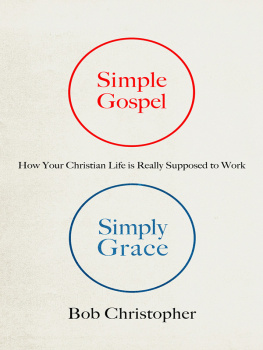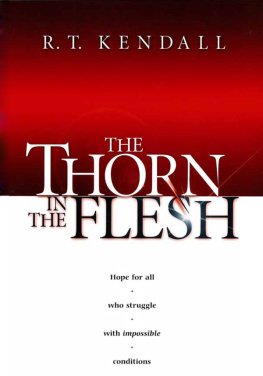GRACE
R. T. KENDALL
GRACE
R. T. KENDALL





To Ernie and Margaret
...................... xiii
.............................. 7
........................ 23
................ 29
........................... 43
......... 51
......... 69
........................ 81
............................ 109
....... 125
.................... 137
................ 149
...................... 165
................... 177
................ 189
....................................... 203
Preface
 BOUT SIX YEARS ago I was having a conversation with myself that went like something like this: "I think I will stay at Westminster Chapel for exactly twenty-five years. Then I will retire. Louise and I will live in Key Largo, Florida. Since nobody knows me in America I will become a recluse and spend my time bonefishing twenty-four hours a day." I was not praying; I was only imagining.
BOUT SIX YEARS ago I was having a conversation with myself that went like something like this: "I think I will stay at Westminster Chapel for exactly twenty-five years. Then I will retire. Louise and I will live in Key Largo, Florida. Since nobody knows me in America I will become a recluse and spend my time bonefishing twenty-four hours a day." I was not praying; I was only imagining.
At that moment the Holy Spirit spoke to me: "Your ministry in America will be to charismatics."
"Oh, no," I responded. For I wanted to reach evangelicals. I have the knowledge and also the credentials to reach evangelicals. They need what I have to offer, especially regarding the Holy Spirit.
But no, it would be a ministry largely to charismatics. Then the Lord seemed to point out to me, "Who was most qualified to reach Jews two thousand years ago? Was it not Paul the Apostle? Did he not have the knowledge to reach Jews, and did he not have the credentials?" But the Lord said to Paul, "Your ministry will be to Gentiles." He must have thought. Oh, no, I want to reach my own people. But Paul's ministry was largely to Gentiles. And though I do continue to get gracious invitations from evangelicals and non-charismatic churches, it is largely charismatics who beckon for my ministry. As to my time spent fishing, I did more of that when I came over to Florida in the summers when I was still at Westminster Chapel!
I can't be sure why God said that word to me. He doesn't speak to me like that every day. But one of the strongest confirmations of this word has not only been so many of my preaching invitations coming from churches regarded as charismatic, but also the amazing fact that Stephen Strang, publisher of Charisma House, has asked to publish virtually all of my books! The present bookGrace-is an example of this.
The funny thing is, I wrote Grace not with charismatics in mind. Not at all. It was written while I was still the minister of Westminster Chapel, and I had evangelicals in mind! Believe it or not, many of them do not have a solid understanding of either grace or the Law. Some of them would deny this, but I know what I am talking about. I wrote this book for them. It is an exposition of the Law of God with particular reference to the Ten Commandments and the New Testament doctrine of assurance. But I suspect all those who regard themselves as "charismatic" in some sense will profit from this book. This is because, sadly, so many Christians-whether evangelical or charismatic-are confused as to the meaning of the Law and its place in the ordo salutis (order of salvation).
My family and I went to England in 1973 not for me to be the minister of Westminster Chapel but to do the doctorate of philosophy in theology at Oxford University. I spent three years there immersed in the reformed doctrine of sanctification, faith, assurance, and the Law. I studied both the Reformers and the Puritans day and night for three years. It was they who gave us the historic Westminster Confession of Faith (1648). Though the book you now hold in your hands is not an academic book-it is written simply for all to understand-it is nonetheless part of the fruit of my doctoral studies at Oxford.
Called Just Grace when first published by SPCK in Great Britain, this book is now called, simply, Grace. I want to thank Alison Barr for the work she did when I was in London, and now I thank Debbie Marrie for her work over here. I must also thank Barbara Dycus for her hand in this publication and, of course, my friend Stephen Strang for publishing this book.
I warmly dedicate this book to Ernie and Margaret Paddon. They were most faithful prayer partners when I was the minister of Westminster Chapel. Ernie prayed for me an hour a day for the better part of my twenty-five years there. He was a deacon at the Chapel and church secretary for most of my time there. It was he who originally put the idea to me that I should preach on and write a book on the Ten Commandments. So here it is.
I hope this book will be a blessing to charismatic Christians as well as evangelicals. I pray for exactly this. As to why God would give me a ministry to charismatics in my own country, I am still not sure. You tell me!
-R. T. KENDALL
KEY LARGO, FLORIDA

Foreword
 HOULD WE APPLY grace or righteousness?" I was being asked a question at an open forum for leaders, and this one provided a real shock to my system. The questioner explained that an unmarried couple who was living together was asking about the possibility of being baptized at his church. The inquirer clearly saw grace and righteousness as alternatives-a serious mistake and one that the book in your hands ably addresses.
HOULD WE APPLY grace or righteousness?" I was being asked a question at an open forum for leaders, and this one provided a real shock to my system. The questioner explained that an unmarried couple who was living together was asking about the possibility of being baptized at his church. The inquirer clearly saw grace and righteousness as alternatives-a serious mistake and one that the book in your hands ably addresses.
When God declared the first covenant obsolete (Heb. 8:13) and introduced a new covenant, He was not throwing in the towel in the battle against sin. He was revealing a new and better way of overcoming it. In the coming of Christ, grace suddenly "appeared" (from Greek epiphany, "shone out"), not to lower the standards but to equip believers to rise to unprecedented heights (Titus 2:11).
Not that God had not always been gracious. When Moses asked for a revelation of God, he was told that God's presence would pass before him and that God would reveal His name. So Moses heard, "The LORD, the LORD, the compassionate and gracious God, slow to anger" (Exod. 34:6). God has always been gracious. However, grace was particularly displayed in Christ's coming. The Law came by Moses, grace and truth came through Jesus Christ, and of His fullness we have all received grace upon grace. (See John 1:16-17.)
Grace certainly shone out in the coming of Christ, but grace does not come to lower the standard; it comes to motivate and enable us to live a totally new life. Paul told Titus that the grace of God appeared instructing us to say no to ungodliness (Titus 2:11-12).
Saying no is a vital part of holy living. The downward gravitational pull of human society is so all-pervasive that if we do not learn to say no we will soon be in trouble. If young women do not learn to say no they will be quickly compromised by the opposite sex. If young men do not learn to say no they will soon be experimenting with drugs and alcohol.

















 BOUT SIX YEARS ago I was having a conversation with myself that went like something like this: "I think I will stay at Westminster Chapel for exactly twenty-five years. Then I will retire. Louise and I will live in Key Largo, Florida. Since nobody knows me in America I will become a recluse and spend my time bonefishing twenty-four hours a day." I was not praying; I was only imagining.
BOUT SIX YEARS ago I was having a conversation with myself that went like something like this: "I think I will stay at Westminster Chapel for exactly twenty-five years. Then I will retire. Louise and I will live in Key Largo, Florida. Since nobody knows me in America I will become a recluse and spend my time bonefishing twenty-four hours a day." I was not praying; I was only imagining. HOULD WE APPLY grace or righteousness?" I was being asked a question at an open forum for leaders, and this one provided a real shock to my system. The questioner explained that an unmarried couple who was living together was asking about the possibility of being baptized at his church. The inquirer clearly saw grace and righteousness as alternatives-a serious mistake and one that the book in your hands ably addresses.
HOULD WE APPLY grace or righteousness?" I was being asked a question at an open forum for leaders, and this one provided a real shock to my system. The questioner explained that an unmarried couple who was living together was asking about the possibility of being baptized at his church. The inquirer clearly saw grace and righteousness as alternatives-a serious mistake and one that the book in your hands ably addresses.